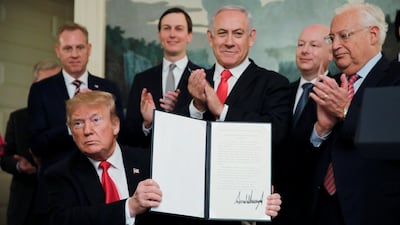US President Donald Trump on Monday formally recognised Israel's sovereignty over the Golan Heights, breaking long-standing US and international policies on the occupied territory.
Mr Trump signed a proclamation in the presence of Israeli Prime Minister Benjamin Netanyahu after the two leaders held talks at the White House.
The move boosts the re-election campaign of Mr Netanyahu, who had to cut short his visit to Washington amid an Israeli military build-up near Gaza after a rocket landed near Tel Aviv.
"This was a long time in the making and should have taken place many decades ago," Mr Trump said before signing the proclamation.
Syria immediately slammed the decree as a "blatant attack on its sovereignty and territorial integrity".
The UN declared Israel's annexation of the Golan Heights in 1981 to be "null and void and without international legal effect" and called on Israel to withdraw from the area immediately.
Arab League Secretary General Ahmed Aboul Gheit also condemned the US recognition, saying Mr Trump's decision did not change the area's status.
Lebanon, which is technically at war with Israel, said the Golan Heights were "Syrian Arab" territory and "no country can falsify history by transferring" land from one country to another.
Turkey's Foreign Minister Mevlut Cavusoglu said Turkey would act against the US move, including at the UN.
The Security Council is expected to discuss the US action on Wednesday, when it decides on extending the mandate of the UN force sent to the Golan as a buffer between Israel and Syria.
Former US negotiators and envoys told The National they were puzzled by the Mr Trump's decision and feared it could backfire.
Dennis Ross, a distinguished fellow at the Washington Institute for Near East Policy and a former US envoy in the Middle East peace process, questioned the value of the decision.
"At a time when Israeli control of the Golan Heights is not being questioned internationally or by Arab leaders, precisely because Iran, Hezbollah and Shia militias are embedding themselves in Syria, this decision forces everyone to take a position and reject it," he told The National.
Mr Ross, who worked on the Syrian peace track during the Clinton years, feared that such a decision could corner Arab leaders.
“Why trigger that? Why not continue to make the issue the Iranian and Shia militia presence and their increasing control in Syria?" he asked.
"Similarly, if the administration intends to present its peace plan soon, why take a step that makes it harder for Arab leaders to be responsive to the US?”
US officials outside the White House were also puzzled. A State Department official said this was purely a decision by Mr Trump and his White House team, adding that some US diplomats who followed the issue learnt about it over Twitter.
Robert Danin, a former senior State Department official and senior fellow at Harvard’s Belfer Centre, also decried the decision, saying it "raises many more questions than it answers”.
“First are issues of principle having to do with the admissibility of the acquisition of territory through armed conflict,” said Mr Danin, who served in the Bush administration.
“Then there are region-specific ones. Specifically, how does it advance US, or even Israeli, interests when it comes to the overriding concern about Iran and its proxies' expansion, especially in conflict areas like Syria.”
Mr Trump had announced his intentions on the Golan in tweet on Thursday, describing the area as critical to Israel's security and regional stability.
His announcement was swiftly criticised by US allies. France repeated that it did not recognise Israel's annexation of the Golan, saying UN Security Council resolutions had recognised it as illegal.
Germany insisted that the Golan Heights was Syrian territory and said its position was that "national borders should be changed only through peaceful means between all those involved".
European Council President Donald Tusk insisted the EU would not change its position on the Golan Heights.
"The European Union does not recognise Israeli sovereignty over the Golan," Mr Tusk said.
Mr Aboul Gheit said the decision was "outside the international legitimacy" and that "no country, no matter how important it is, can make such a decision".
President Recep Tayyip Erdogan of Turkey, a Nato ally, said Mr Trump's declaration had brought the region "to the brink of a new crisis and new tensions".
"We will never allow the legitimisation of the occupation of the Golan Heights," Mr Erdogan said.
Mr Trump drew similar criticism when he acceded to another long-standing Israeli demand by recognising Jerusalem as Israel's capital and moving the US embassy there last year.
That drew international condemnation and angered Palestinians and US allies in the Middle East who support the Palestinian aspiration for an independent state, with East Jerusalem as its capital.

